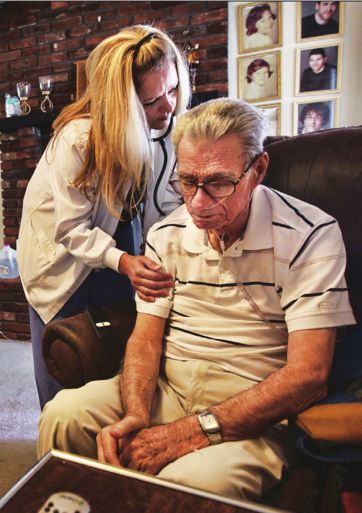Happier endings
The last conversation most cancer patients have should be the first
DYSPEPSIANA | James Krohe Jr.
You’re in your doctor’s office. You’ve just been told that you have cancer – one of the bad ones, like those that attack the pancreas or the liver or the lungs or the ovaries – and that it has spread. The doctor will then tell you what he or she intends to do to help you fight it. What he is less likely to tell you is what he intends to do if you lose that fight.
Guidelines for end-of-life care advise against chemotherapy and admittance to intensive care units in the final two weeks of life. At that point chemo almost never does any good, and most terminal cancer patients would rather die at home than in an ICU. Recently researchers at the Dartmouth Atlas of Health Care looked at how diligently cancer treatment facilities followed those guidelines. Nearly a quarter of patients were admitted to an ICU in the last month of life; one in 10 patients received a chemotherapy treatment in their last two weeks.
Why? In many cases, it’s because doctors believe that another-day-at-anycost is what their patients want. But what their patients want is often based on misinformation. A recent study of several hundred patients with incurable lung or colorectal cancers found that between 70 and 80 percent of them believed that the chemo they were being given
as a palliative would cure them, even though cures in such cases are
next to impossible. The causes of the confusion are several. Doctors say
“treat” and patients hear “cure;” doctors say “survival rate” and
patients hear “cure;” doctors say “stabilize” and patients – well,
patients often hear whatever they want to hear.
Which is why more effort needs to be put into telling them what they need to
hear. End-oflife guidelines have long suggested that doctors begin
discussions about end-of-life care shortly after a terminal illness
has been diagnosed, but no one quite knew whether such discussions
actually affected the decisions patients make about end-of-life care. To
find out if they do, staff of Boston’s Dana-Farber Cancer Institute
studied 1,231 patients whose stage IV cancers proved fatal. They found –
again – that nearly half of them had been given aggressive treatment
during their final 30 days. More important, they also found that
patients who had early discussions with their doctors about end-of-life
care were significantly less likely to receive such aggressive late
treatments and were significantly more likely to enter hospice care
before death.
Part
of the problem is that it is very hard to talk with patients who have
not yet come to terms with the fact that their cancers will kill them.
(Patients usually don’t get the lingo. They are angry or in denial.)
Physicians are trained (and rewarded) to treat, not talk, to heal (or at
least to prolong life), not to deal with death. This is a fault in
medical training, not in doctors.
However,
we must also admit explanations less flattering to the medicos. These
include professional vanity, which is a common disease among male
specialists in particular. They strive to keep people alive at all costs
– those costs being paid, of course, by the patient. (I will leave it
to readers to judge whether the fact that oncology practices earn more
than half of their budgets by selling chemotherapy drugs might be a
factor in their decisions to recommend chemo in the face of the
patient’s wishes.) The warrior-doctor is especially reluctant to accept
that being a good doctor sometimes means giving up trying to prolong a
life gone bad to help them to a good death.
Other
MDs assume that they know their patients’ goals and preferences, but
surveys repeatedly show this not to be the case. Patients lie to their
doctors, for one thing. For another, many
doctors, especially surgeons, are famously not empathetic human beings
(although sensitivity to others can be paralyzing to a doctor dealing
with emotionally fraught situations such as dying). And, astonishingly,
there are still physicians who reserve for themslves the right to
withhold the truth from dying patients, thus preventing them and their
families from making intelligent preparations for their own ends. This
is unconscionable arrogance. Patients have the right to make informed
decisions about their health care, including when to stop it.
Happily,
the arrogance or cowardice of so many physicians has spawned a belated
reaction in the profession. I have found young physicians to be more
open and frank about such matters. Physicians-to-be even now have the
option to train for the new medical specialty of palliative care. Such
training distinguishes between treating cancers and treating people who
have cancers. Rather than quixotic efforts to make life longer, such
specialists try to better the quality of the life that is left.
Sadly,
palliative care specialists, like hospice care workers, are usually
among the last people a dying person sees when they should be among the
first. Why is that so? Why don’t you ask your doctor? It might be an
interesting conversation.
Contact James Krohe Jr. at [email protected].